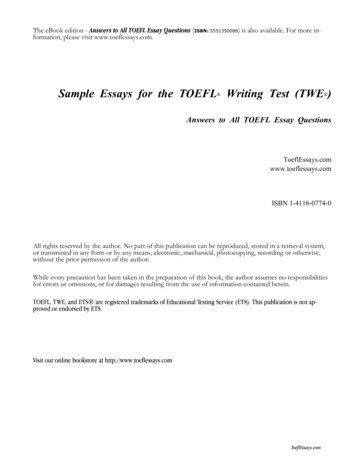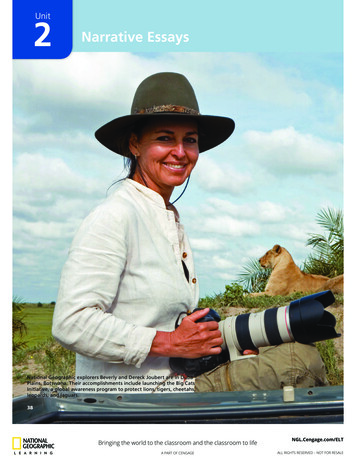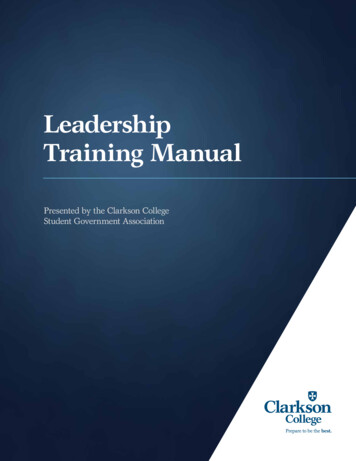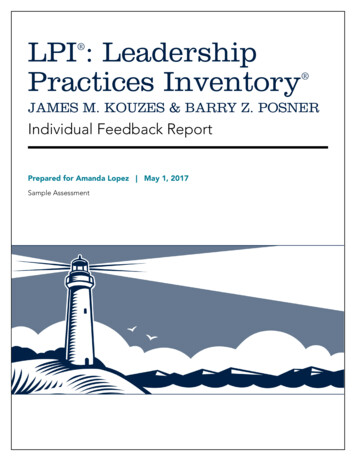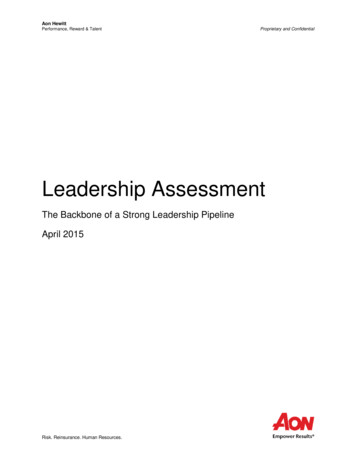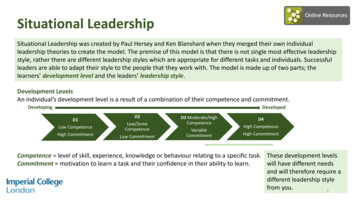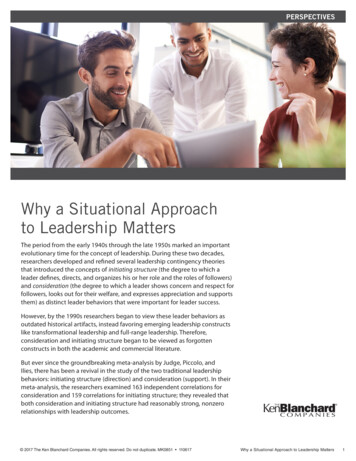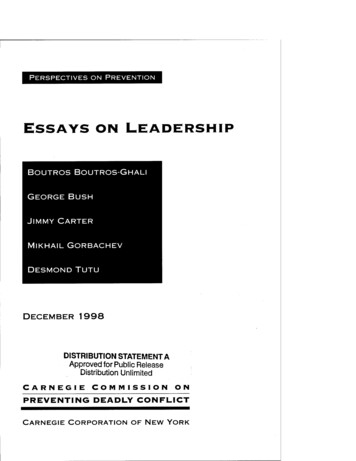
Transcription
PERSPECTIVES ON PREVENTIONESSAYS ON LEADERSHIPBOUTROS BOUTROS-GHALIGEORGE BUSHJIMMY CARTERMIKHAIL GORBACHEVDESMOND TUTUDECEMBER1998DISTRIBUTION STATEMENT AApproved for Public ReleaseDistribution UnlimitedCARNEGIE COMMISSIONONPREVENTING DEADLY CONFLICTCARNEGIE CORPORATION OF NEW YORK
Carnegie Corporation of New York established the Carnegie Commission on PreventingDeadly Conflict in May 1994 to address the looming threats to world peace of intergroupviolence and to advance new ideas for the prevention and resolution of deadly conflict. TheCommission is examining the principal causes of deadly ethnic, nationalist, and religiousconflicts within and between states and the circumstances that foster or deter their outbreak.Taking a long-term, worldwide view of violent conflicts that are likely to emerge, the Commission seeks to determine the functional requirements of an effective system for preventingmass violence and to identify the ways in which such a system could be implemented. TheCommission is also looking at the strengths and weaknesses of various international entitiesin conflict prevention and considering ways in which international organizations might contribute toward developing an effective international system of nonviolent problem solving.Commission publications fall into three categories: Reports of the Commission, Reports to the Commission, and Discussion Papers. Reports of the Commission have beenendorsed by all Commissioners. Reports to the Commission are published as a service toscholars, practitioners, and the interested public. They have undergone peer review, but theviews that they express are those of the author or authors, and Commission publication doesnot imply that those views are shared by the Commission as a whole or by individual Commissioners. Discussion papers are similar to Reports to the Commission but address issuesthat are more time-sensitive in nature.Additional copies of this report or other Commission reports may be obtained free of chargefrom the Commission, or they may be downloaded from the Commissions "Web site:www.ccpdc.orgCarnegie Commission on Preventing Deadly Conflict1779 Massachusetts Avenue, NWSuite 715Washington, DC 20036-2103Phone: (202) 332-7900 Fax: (202) 332-1919e-mail: pdc@carnegie.org
PERSPECTIVES ON PREVENTIONESSAYS ON LEADERSHIPBOUTROS BOUTROS-GHALIGEORGE BUSHJIMMY CARTERMIKHAIL GORBACHEVDESMOND TUTUDECEMBER 199820000112 093CARNEGIE COMMISSIONONPREVENTING DEADLY CONFLICTCARNEGIE CORPORATION OF NEW YORKlynC QUAHT? IMT mED 4
Copyright 1998 by Carnegie Corporation of New York.All rights reserved.009998321Printed in the United States of America
CONTENTSFOREWORDDavid A. Hamburg andCyrus R. VanceLEADERSHIP AND CONFLICTBoutros Boutros-GhaliviQualities of Leadership, iVision, zEloquence, 3A Cooperative Spirit, 4Courage, 5Political Intuition, 5Conclusion, 6AMERICAN LEADERSHIP AND THE PREVENTION OF DEADLY CONFLICTGeorge BushThe End of the Cold War, 8Toward a New Foreign Policy Consensus, 9The Importance of American Leadership, 13The Importance of Credibility, 17Some Policy Considerations in the Use of Force, 19Presidential Leadership Is Essential, xoConclusion, 2j1117
ivESSAYS ON LEADERSfflPJimmy CarterThe United States and the Peace Option, 25Considering the Views of Others, 26Lessons of Ethiopia—Dealing with Pariahs, 27Haiti and North Korea, 29Why The Carter Center? 35The Carter Center's Principles for Peacemakers, 3 5Free Elections—A Key to Peace, 362.3Mikhail GorbachevOn the Meaning of Political Leadership, 41Afghanistan: Out of the Blind Alley, 44The Art of the Possible and of the Necessary, 49On Internal Conflicts, 54On Virtues and Weaknesses of International Leadership, 58New Leaders for the New Century, 6239LEADERSHIPDesmond TutuPreamble, 67Some Attributes of Leadership, 68Conclusion, 7067MEMBERS OF THE CARNEGIE COMMISSION ON PREVENTING71SEARCHING FOR PEACEON NONVIOLENT LEADERSHIPDEADLY CONFLICTMEMBERS OF THE ADVISORY COUNCIL72ABOUT THE CONTRIBUTORS74
FOREWORD1994 Mikhail S. Gorbachev, former president of the Soviet Union,reflected on a decade of intensive involvement with political leaders all overthe world. One of his outstanding conclusions was the large extent to whichthey see "brute force" as their ultimate validation. His observation, basedon abundant experience, highlights a long-standing, historically deadly inclination of leaders of many kinds from many places to interpret their mandate as being strong, tough, aggressive, even violent. For all too many, thisis indeed the essence of leadership.Gorbachev, in control of a vast nuclear arsenal, not to speak of immense power in conventional, chemical, and biological weapons, was wiseenough not to interpret his own leadership in terms of brute force. Yetthere is no shortage of leaders who do. They will have massive killing powersat their disposal in the twenty-first century. This is true not only of nationalleaders but also of subnational groups.IN
viESSAYS ON LEADERSHIPLarge-scale conflict between groups requires the deliberate mobilization efforts of determined political leaders. Without leadership, groupsin similar adverse circumstances—for example, profound socioeconomic inequality, political oppression, and even deep intergroup animosity—donot spontaneously resort to warfare to obtain redress. They tend to seeknonviolent means of improving their conditions and resolving conflicts.Yet incendiary leaders can readily bypass such efforts and mobilize theirfollowers to hatred and violence.By the same token, this observation highlights the critical importance of international leadership for effective prevention of deadly conflict.That is why the Carnegie Commission on Preventing Deadly Conflict emphasizes ". . . although the prevention of deadly conflict requires manytools and strategies, bold leadership and an active constituency for prevention are essential for these tools and strategies to be effective." Yet, this kindof bold and effective leadership is too often found wanting in the face oftoday's deadly conflicts.Unfortunately, we know far more about the role of leaders in stimulating ethnic and communal conflict than in diminishing it. It is crucialto understand the critical determinants of leadership for prevention ofviolence between human groups and nations. Scholars specializing in thestudy of leadership and foreign policy decision making have generateduseful concepts and approaches that may be applied to specific problemsencountered by political leaders when confronted by the challenges of prevention. Moreover, the world can learn valuable lessons from the reflectionof thoughtful, experienced leaders who have earned respect for their dedicated efforts on behalf of peace with justice.The Carnegie Commission on Preventing Deadly Conflict invitedfive world leaders, Boutros Boutros-Ghali, George Bush, Jimmy Carter,Mikhail Gorbachev, and Desmond Tutu, to consider leadership and preventing deadly conflict. Each offers a different perspective, yet all concludethat an individual leader's choices are crucial to creating the conditions thatenhance or undermine peace.This volume highlights the capacities of international leaders.These leaders can help mobilize great financial or military resources, buildinternational coalitions, and create a constituency for prevention. The Commission believes that prevention should be on the agenda of every head ofstate and government meeting and all foreign and defense ministerial gatherings. The international community should champion and reward goodgovernance, especially in countries struggling towards greater democracy.International leaders can call attention to the problem of intergroup violence and tap into latent public inclination toward prevention.They have the scope to explain the need for prevention. They can help
FOREWORDVllbuild the political will necessary to mount an effective response to complexemergencies and to help people prevent violence before it erupts. Addressing this point in his essay, former United Nations Secretary-GeneralBoutros Boutros-Ghali highlights the need for vision, communication, andcooperation.Conflict prevention is not just a one-time act, but a broad orientation, a pervasive way of thinking and relating to other leaders. FormerU.S. President George Bush stresses the importance of building relationships and maintaining credibility so that in times of crisis allies can be persuaded, not bullied, into cooperation to achieve a common goal.Leaders close to potential conflict can help educate the publicabout nonviolent ways to settle disputes. In his essay, Mikhail Gorbachevaddresses nonviolent responses to the breakup of the Soviet Union. Hepoints out that modern leaders need to change their outlook; because ofthe shadow of nuclear weapons, the use of massive force cannot necessarilybe a first resort. Instead, a modern leader needs the intellectual and moralauthority to persuade rather than to compel.At times the choice for peace means dealing with difficult, evendangerous and cruel leaders. Former U.S. President Jimmy Carter explainswhy he believes it is necessary to engage international political outcasts inthe search for peace. He reflects on how understanding the perspective ofsuch leaders—without abandoning his own beliefs—has helped him advance peace negotiations and save lives in several instances.Successful leaders often speak the language of moral suasion. Archoishop emeritus of Cape Town, Desmond Tutu, asks why people worldwide respect Nelson Mandela, the Dalai Lama, and the late Mother Teresa.Archbishop Tutu observes that great leaders have personal credibility,solidarity with the people they are leading, and an ability to nurture thebest in others.The leadership needed to prevent deadly conflict is not confinedto the political sphere. Leaders of other powerful institutions can make aprofound difference: e.g., religious, business, and media leaders. Indeedthey can have a moderating effect on unwise political leaders.Leadership must come to mean drawing on the best resources: intellectual, technical, and moral as well as material resources; being thoughtful,well informed, active, creative, and respectful to others in helping to clarifygreat dangers and ways of coping, and providing a moral and operationalbasis for dealing constructively with international problems.There are illuminating examples in the violent twentieth century.The authors in this volume stand out. Similarly, Harry S Truman, GeorgeMarshall, and Jean Monnet looked beyond the devastation of the SecondWorld War and the underlying hostilities to envision a Europe in which
vüiESSAYS ON LEADERSHIPregional competition would transcend adversarial boundaries and traditional rivalries. They foresaw that large-scale economic cooperation wouldfacilitate not only postwar recovery but also long-term prosperity and international peace.Bringing this vision to fulfillment required creative efforts to educate the public, mobilize key constituencies, and persuade reluctant partners. Maintaining this support required courageous use of scarce politicalcapital.An enduring constituency for international engagement can befostered through measures that identify public inclinations toward engagement and reinforce these impulses with clear rationales, approaches, andsuccessful examples. It helps to have analogies from familiar contexts ofhome and community. Such efforts are more likely to succeed if leadersfrom multiple sectors are involved: government, media, business, and civilsociety.A useful model is provided by the experience in public health overseveral decades. A strong constituency for preventing deadly diseases hasemerged. This has led to improved rates of immunization, better diet andexercise practices, and reduced cigarette smoking, and in turn to diminishing the casualties of a variety of diseases. This approach to leadershipand public education can be usefully applied to the worldwide problemsof conflict.One of the primary goals of the Commission has been to make leadersmore aware of the opportunities for preventing deadly conflict. By presentingthe insightful reflections of five distinguished leaders from diverse backgrounds, we hope this volume will make a significant contribution.DAVID A. HAMBURGCYRUS R. VANCECochairs
LEADERSHIP AND CONFLICTBoutros Boutros-GhaliTHE CENTURY NOW STUMBLING TOWARD ITS CLOSE is,by common acknowledgment, the bloodiest in history. To understand the causes of conflict andto turn back this tide of violence are the most immediate necessities facinghumankind as the twenty-first century comes into view.Yet the twentieth century also has produced history's most admirable instances of international cooperation. The nations of the world havecreated systems, institutions, doctrines, and agreements designed to prevent, contain, and resolve conflict and to make the resort to warfare lesslikely over the long term. The record of achievement over the decades isastonishingly long: arbitration treaties; the concept of collective security;disarmament conventions; the growth of international law; the International Labor Organization, the League of Nations, and the United Nations;the Geneva and Genocide conventions; alliances and coalitions againstaggression; the recognition of the role of economic and social development; the global drive for democratization; and the recent continuum of
lESSAYS ON LEADERSHIPglobal conferences designed to address the causes of deprivation and confrontation. 'Elken together, historians are bound to regard this record asan epic effort to deal with the age-old scourge of war.Today we are in the midst of a struggle to deal with the new faceof conflict that has emerged in the aftermath of the Cold War. There isa vital need to regain momentum toward an expanded and increasinglyeffective international system. It is at just such a point as this, now as indecades past, that leadership becomes more crucial than ever. As the political philosopher Isaiah Berlin put it, "at crucial moments, at turningpoints, when factors appear more or less equally balanced, chance, individuals and their decisions and acts, themselves not necessarily predictable—indeed, seldom so—can determine the course of history."QUALITIES OF LEADERSHIPLeadership, of course, is much more than "individuals and their decisionsand acts." Leadership as a quality may be more innate than acquired, butsome qualities and characteristics can be identified and consciouslybrought to bear during complex and difficult times like the present.VISIONNo one leads by fiat in the modern world. Vision and the ideas throughwhich it is defined are crucial. Ideas are what mobilize people and galvanizethem to join in an action for shared benefit. Every leader must explain theconcept behind a decision or act, and that idea may well take on a life ofits own, even to the point of exceeding the control of its originator.From where should ideas be derived? The propensity to rely onpast authority is an inherent human trait and is indispensable to the stability of society. Virtually every major religion, culture, or political systemis designed so that decision makers will look backward, back to a sacredtext, back to a founding political document such as a constitution orcharter, back to the precedent established in common law or to a statuteenacted long before the case at hand arose. In times when change is slow,precedent can often be a sufficient principle by which to guide a society.But in a revolutionary time such as this, marked by the acceleration ofevents, decisions must not be based so much on precedent as on theirprospective impact. In these circumstances, leadership must be able to conceive of original and path-breaking ways to make progress. We cannot becontent to live on the accumulated wisdom of the past. Old ideas mustbe repackaged and infused with new substance to meet the changing needs
BOUTROS BOUTROS-GHALI3of the present. When the imagination produces new ideas and pointstoward new directions, another dimension emerges.Ideas and concepts can carry a message far in time and space. Aftera reporter noted a phrase that I used during a trip to Africa, I found myselfdescribed in the press as the originator of the concept of "underdogconflicts." The concept highlights the imbalance in the internationalcommunity's intense concern for a conflict in one place (usually in the developed world) and neglect or disregard for a far more devastating situationsomewhere else (usually in a developing country). This phenomenon ismorally indefensible and detrimental to efforts by many leaders to reducethe level and frequency of conflict worldwide. The concept of underdogconflicts deserves much more attention.But ideas are not in themselves enough. Ideas must be woven together into a viable and coherent strategy. Each controversy, conflict, ordiplomatic problem will generate or respond to a particular idea or set ofideas. But the ideas must fit into a larger scheme. Individual ideas, whichmay appear to be workable in specific cases, may fail to solve the problemand may even worsen it in the absence of a viable and coherent strategy.The history of the international involvement in the conflict in theformer Yugoslavia, for example, could be written in terms of its multiplicityof concepts: "peacekeeping," "preventive deployment," "lift and strike,""safe areas," "close air support," and others. But that experience demonstrated that a comprehensive and fundamentally coherent overall strategymust be used to define and test the validity and practicality of various ideas.Without such a strategy, concepts will not serve to resolve conflicts; theywill simply add a layer of ideas that themselves may be incompatible andcontend against each other.ELOQUENCEEven a viable and coherent strategy cannot be fully effective unless it is communicated to the public in a way that will gain their support, and it is putinto effect cooperatively with others. As with so many other aspects of worldaffairs today, communication and cooperation, both age-old activities,must be conducted under vasdy changed circumstances.Communication between leaders and peoples in this media-saturatedage has increasingly become a matter of entertainment, theater, and ceremony. Images reach people almost instantly and influence their attitudesand decisions more powerfully than more precise and comprehensive writtenassessments. This places a heavy responsibility on leaders, the media, andindividuals: leaders must ensure that communicative powers are not abused,the media must ensure that all aspects of an issue are explored fairly, and
4ESSAYS ON LEADERSHIPindividuals must insist upon solid information beneath the unavoidablysuperficial character of today's communication. Above all, leaders mustspeak out to set the record straight. Unless they do, distortions of realitycan become part of the accepted interpretation of the past and mistakenlessons can be drawn by future generations.There is also a deeply moral responsibility that leaders bear in theirefforts at communication. This involves advocacy for those individuals,peoples, and events that are "orphaned" by the global media in general.The poverty-beset individual, the desperate family, the beleaguered minority, the ghastly conflict that the press overlooks—all these will be voiceless unless the leader speaks for them.In this age of communication, words are tantamount to deeds. Theold distinction between what is said and what is done no longer holds up.Leaders therefore need to understand the vast power of their utterances andbe ever-more responsible communicators as a result.Democratization—one of the greatest projects of our time—deepensthe need for good leadership. In an age of near total communication, pressures grow for ever more direct democracy. The outcome often can be government by opinion poll, where leadership becomes followership, or, conversely, demagogic authoritarianism. Representative democracy providesboth accountability to the public and an arena for responsive and creativeleadership. Such challenges to leadership can be observed today in themany examples of countries seeking to democratize. In such cases trueleaders understand that undemocratic means must not be used to achievedemocratic ends, for such attempts can never successfully serve the longterm interests of leaders, peoples, or the future of their countries.A COOPERATIVE SPIRITCooperation is also a concept transformed by contemporary change. Cooperation is no longer one option to be weighed against the advantages of"going it alone." Globalization means that no major problem can be effectively and enduringly dealt with unilaterally. The great conflicts of the twentieth century have demonstrated the overriding necessity of cooperationand coordination among states and peoples. The idea of unilateral actionin response to conflict has progressively been scaled back until it realisticallycan apply today only to limited conflicts, and even then only for a limitedtime.Cooperation in the first instance must be achieved internally—anobjective that has always been harder to achieve in democratic societies,and those societies today are proliferating. The complexity of modern life
BOUTROS BOUTROS-GHALI5also has multiplied the number of players and groups within a country whomust have a say in matters of international affairs, issues that no longercan be regarded as the province of a special elite but that are now correctly understood to be inextricably intertwined with the domestic issuesof everyday life. Just as these factors have complicated the job of coordination within a single country, they have on a larger scale made coordination among international partners more difficult and time consuming. Atthe same time, these factors of complexity can also be positive, offeringmore channels and greater opportunity for more deeply rooted, enduring,and effective solutions. It is the task of leadership to resolve the complexityand realize the opportunity.COURAGENot every conflict can be solved by cooperative means. Courage also isessential if the leader is to succeed in the task of turning vision into reality.There are implacably dangerous enemies of peace and human dignity atlarge in the world. Unless there is the will to act when the situation demands action, war will become more not less frequent, and new horrorsand atrocities will be unleashed on the world. When the ability to act isevident, and when courage is perceived in a leader and in a people, thechances that diplomacy can work are immeasurably enhanced. But couragemay also mean pursuing efforts that require accepting the risks of failurewhile allowing others to receive the tributes of success.POLITICAL INTUITIONPolitical intuition is, for me, the summum bonum of all these leadershipqualities. Leaders must sense where, when, how, and with whom progresscan be made.Political intuition requires timing. When have warring partiesreached a susceptible moment of fatigue? When will the public demandor reject action and how does that public opinion fall into phase, or failto do so, with the needs of the moment, politically, diplomatically, andmilitarily? The moment—when it appears—must be seized.Political intuition requires an awareness that "everything counts,"that no issue is too small or too remote to be potentially significant. In international affairs this means that a truly global outlook is required. The superpowers had such an outlook during the Cold War, but have become moreselective in their foreign policy interests since then. It is highly importantthat leaders regain the sense that even small and far-off details eventually
6ESSAYS ON LEADERSHIPcan have vast and far-reaching implications. The new perspective offeredby "chaos theory," that the beat of a butterfly's wing can lead to a typhoonin another continent, can apply to matters of statecraft as well as to mattersof meteorology.Without diminishing in any way the importance of law and institutions, the time has come to recognize that the age-old qualities of leadership have not been given enough recognition recently. The best institutions are of little use in the absence of true leadership. On the other hand,an outstanding leader can make effective use of virtually any basicallysound institutional system.Western emphasis on structures of government has added important new dimensions to the study of statecraft and the management ofstates. But good leadership continues to be essential to the long-term success of governance, even though leadership may today be measured indifferent terms.CONCLUSIONPerhaps the time has come to give fresh recognition to the ancient wisdomthat placed such strong emphasis on the qualities of leaders. In consideringgovernance, the scholars and statesmen of the non-Western traditions ofIslam, India, and China, among others, paid relatively scant attention tostructure. Matters such as the separation of powers, cabinet government,or the electoral system were of little or no interest. What mattered fromtheir perspective were the qualities of the leader. In uncounted volumeson statecraft in these ancient traditions, entire chapters are devoted toattributes of leadership such as benevolence, knowledge of foreign tongues,mental discipline, and physical stamina and ability. Examples, like theability to ride a horse at breakneck speed while shooting an arrow at a faroff target, might be drawn from reality while at the same time standingmetaphorically for the required skills of statecraft.Today, as in the past, leadership remains an essential ingredient atall levels of human life. In this time of historic transition, we urgently needleadership that, while constantly and closely attuned to the rapidly changing pulse of human affairs, can project a comprehensive, coherent, and compelling vision of human society, communicate that vision convincingly tothe world's peoples, foster its implementation through cooperative endeavor, and make and follow through on the hard decisions that will inevitably arise. The quality of leadership we engender—globally, nationally,and at the grass-roots level—will determine the kind of world we live in,and the state of the world that future generations will inherit.
AMERICAN LEADERSHIPAND THE PREVENTIONOF DEADLY CONFLICTGeorge BushDURING THE FOUR YEARS of my presidency, both the world in which welive and the way in which we Americans relate to it were transformed. Withthe end of the Cold War and the collapse of the Soviet Union, the UnitedStates emerged as the world's only remaining superpower. At the sametime, not only how—but even whether—we should exercise this uniquestatus began to be questioned in our own country. This process of reexamination and reassessment continues as we work toward a new consensusabout America's role in the world.It is not surprising that this redefinition of America's relation tothe world remains a work in progress. In contrast to the post-World WarII period (and more like the period after World War I), there is no singleexternal threat that focuses our attention, galvanizes us into action, andspeeds the formation of a new consensus about our interests, role, and responsibilities in the world beyond our borders. But even at this point, twothings already are clear. The first is that the outcome of the debate and
8ESSAYS ON LEADERSHIPthe content of the new consensus will be of profound importance not onlyto our own country and its well-being, but also to the peace and stabilityof the world. The second is that the United States and, in particular,American leadership must play a unique and indispensable role in the prevention of deadly conflict in the post-Cold War world. This essay providesme the opportunity to explain why I am convinced of the correctness andimportance of both points.THE END OF THE COLD WARThere is widespread agreement that the end of the Cold War was a triumphfor the United States and the West; but even several years later, there is littleconsensus about its meaning and implications for the future. As a result,it is not surprising that we call the period in which we now find ourselvesthe "post-Cold War" world, defining it as much by reference to what it isnot and by what is behind us, as by what it is and by what lies ahead of us.A few features of the post-Cold War environment already are clear.First and most obvious, our victory in the Cold War—not only the fact thatwe won it but how we won it—transformed what might be called our "security environment." This occurred in the fundamental sense that the veryreal threats to our national security interests and core values we faced fora generation have disappeared for the foreseeable future. Notwithstandingall the issues and problems we confront in the post-Cold War world, nonecompares to the dangers—including the specter of nuclear annihilation—we faced during the Cold War. The simple but remarkable fact is that, forthe first time in my adult life, the United States no longer faces a directmilitary threat to its vital interests.Second, and perhaps less obvious, the end of the Cold War offersnew possibilities. It opens the way for the diffusion of market economiesand democracies around the world, including into areas that had been cutoff from freedom and free choice for a generation. Relieved of the fear thatactions we might take could spark a superpower confrontation—or worse—it also gives us a new freedom of action. We have been presented with historic opportunities to shape an international order that better reflects ourvalues and serves our interests. These opportunities allow us to showcasewhat we Americans stand for and believe in while—we hope—exercisingthe good judgment to resist the temptation to lecture others about howthey need to become more like us.Third, the end of the Cold War has not led to a kind of international Gar
AMERICAN LEADERSHIP AND THE PREVENTION OF DEADLY CONFLICT George Bush 7 . vi ESSAYS ON LEADERSHIP . These leaders can help mobilize great financial or military resources, build international coali
